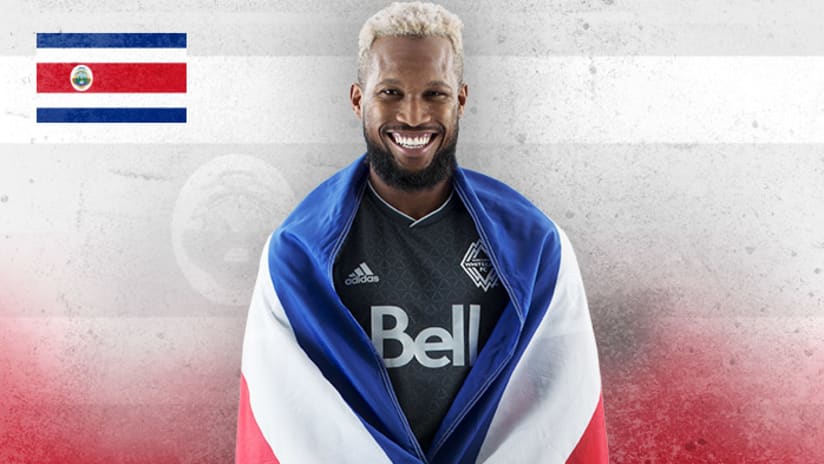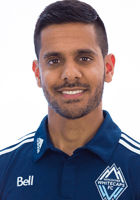VANCOUVER, BC – “This can’t happen. This can’t happen.”
Those were the thoughts going through Kendall Waston’s mind on October 7, 2017, with Costa Rica trailing 1-0 to Honduras in the dying stages of their penultimate 2018 FIFA World Cup qualifying match.
Costa Rica needed a draw to book their ticket to Russia.
If unable to muster up a point, Los Ticos would have to travel to Panama and get a result there three days later – no easy task – to guarantee their place at the world’s most prestigious soccer competition.
Waston did not want this opportunity to slip away. He wanted to take care of business now. On home soil. In front of the 24,948 fans in San José, Costa Rica who were still reeling from the devastating hurricane that had ravaged the nation in the days prior. In front of his wife, with whom he was celebrating his fifth wedding anniversary on that very day.
This was Waston’s World Cup.
He needed this. The country needed this.
So Waston’s eyes lit up when coach Óscar Ramírez waved him forward from his defensive position towards the end of the match – a last-gasp effort to snatch an equalizer. It was time for The Big Man to take matters into his own hands, or rather, his head.
You know how the story goes from here.
In the fifth minute of stoppage time, Waston powered home a header on a cross from Bryan Ruiz, sending the stadium – and presumably the entire nation – into an absolute frenzy.
¡GRACIAS KENDALL! GOLAZO
— Teletica Deportes (@TeleticaTD7) October 8, 2017
Más: https://t.co/CeQ5ORxbG0pic.twitter.com/dzIUWdLcFe
He did it.
Waston scored the goal that sent his country to the World Cup. And just like that, he became a national hero. Some would say it was the defining moment of his career.
And in many ways, it was.
But the reality is that Waston’s rise to stardom has been littered with defining moments: from convincing his grandparents to let him move out at the age of 15, to being told by a coach to try basketball because he wasn’t cut out for soccer, and – one of the low points of his career – being left off Costa Rica’s roster for the 2014 World Cup.
As Waston’s wife, Priscila, put it: “it’s been a crazy, crazy, journey of soccer.”
Ultimately, it was those trials and tribulations that led Waston to Vancouver, where he took his game to new heights and established himself as one of the premier centre backs in the entire region of North/Central America. And on Wednesday, the 'Caps captain announced himself to the world stage, scoring a patented header against Switzerland in his FIFA World Cup debut.
In order to truly appreciate Waston’s story, however, you need to go back to the very beginning.
EARLY DAYS
Kendall Jamaal Watson Manley was born in San José, Costa Rica on January 1, 1988.
Manley is his mother’s last name and “Watson” – not “Waston” as he’s known by now – is his father’s. But as the story goes, Kendall’s grandmother once made a clerical error registering his name and the rest is history.
“It’s Watson,” said Kendall’s mother, Elizabeth Manley. “But they made a mistake so it had to stay that way. We couldn’t do anything.”
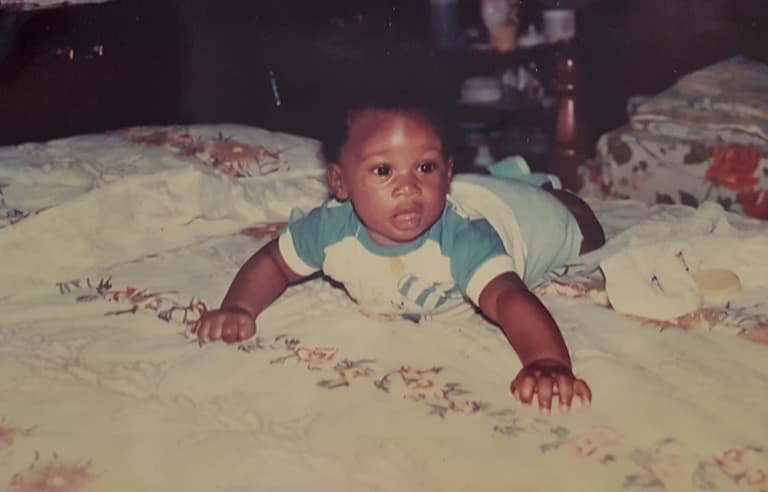
Though he was born in the capital city of San José, Waston grew up in Limón – a port city located on the eastern coast of Costa Rica, looking out over the Atlantic Ocean’s Caribbean Sea.
“We have a lot of beaches,” Waston said. “Great beaches. You see people surfing, the rasta, the dreadlocks. It’s a place where a lot of tourists go.”
Limón is widely considered to be hub of Afro-Costa Rican heritage.
Most of Costa Rican’s African descendants arrived in the late 1800s from the British West Indies, primarily Jamaica, as hired workers to build a railway connecting San José and Limón on the Caribbean coast – and then remained in Limón to work on the banana plantations.
Until 1949, however, the Costa Rican government did not recognize these Afro-Caribbean people as citizens, which prevented them from moving freely within the country. As a result, they became entrenched in Limón and many decided to stay even after the segregation laws were lifted.
That is part of the reason why Limón remains one of the most cultured regions in Costa Rica.
“The culture there is different from all my country,” Priscila said. “The food, the traditions, and the people, everybody is different. I think they have more flavour.”
“We are happy go lucky people,” added Waston's mother, Manley. “We love our carnivals, our music, our food. You really feel free. As we say, Pura Vida.”
In English, “Pura Vida” is translated as “Pure Life.” It is used in many different ways – as a greeting, a farewell, a form of gratitude, and so on. Ultimately, though, it is a way of life in Costa Rica. As Waston said back in 2016: “It means to be happy, not stress, and live life to the fullest no matter how good or bad your situation is.”
That’s something Waston has always tried to do.
And there were times when that ideology was put to the test. Waston said he grew up in a dangerous part of the city, where he saw “a lot of problems, guns, drugs, and those situations.” The homicide rate in Limón is typically the highest in the country and it has been identified as a region where organized crime is prevalent.
But it was largely a matter of “the people you associated yourself with,” Manley said, and Waston’s family always urged him to stay on the right path.
As a young child, Waston was raised primarily by Manley and her parents. His father worked on a cruise ship and would typically only be home once a year, plus two months of vacation. And after Waston’s parents went through a divorce, he would see his father even less.
“I never had that father and son chemistry,” Waston said.
Waston and his mother, on the other hand, were inseparable. And that’s why it was such a shock when Manley moved to New York when Waston was just eight years old.
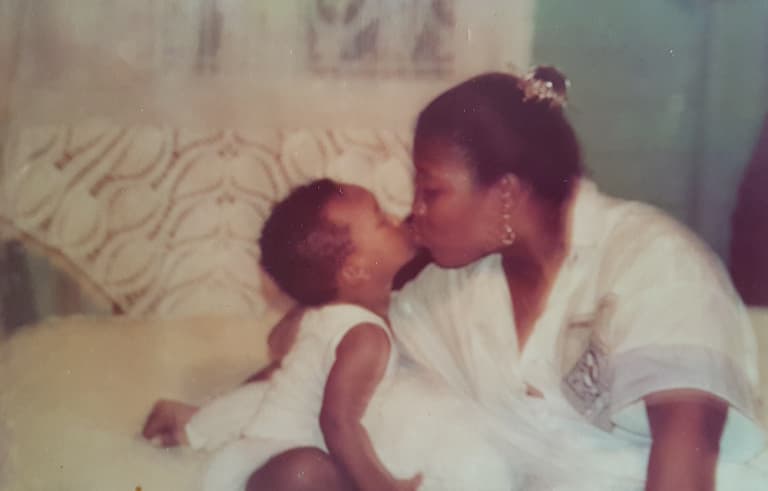
“I don’t blame any of them,” Waston said. “My father worked on a cruise. And it was the chance he could get to earn money and give his son the best opportunity. And my mom, she decided to leave to look for the same, to get a better opportunity than what she was getting in the country. I don’t regret anything. The only thing I would have wanted when I was younger, I always wanted to see my parents together, growing up with them, like a normal house and like a normal kid.”
Manley said she would have loved nothing more than to bring Waston with her to New York, but she wasn’t able to move him there legally. The decision to leave him behind was “very hard,” but she just felt it was the right thing to do at the time.
“Although I left him when he was eight years old, we still always have that attachment,” an emotional Manley said with tears running down her face. “Almost every day, when he was in Costa Rica, I used to call and talk with him. And every year, we made sure he could come and visit me.”
At one point in Waston’s early to mid 20s, however, they went four years without seeing each other, ultimately reuniting at the 2013 CONCACAF Gold Cup at one of Costa Rica’s matches in Connecticut.
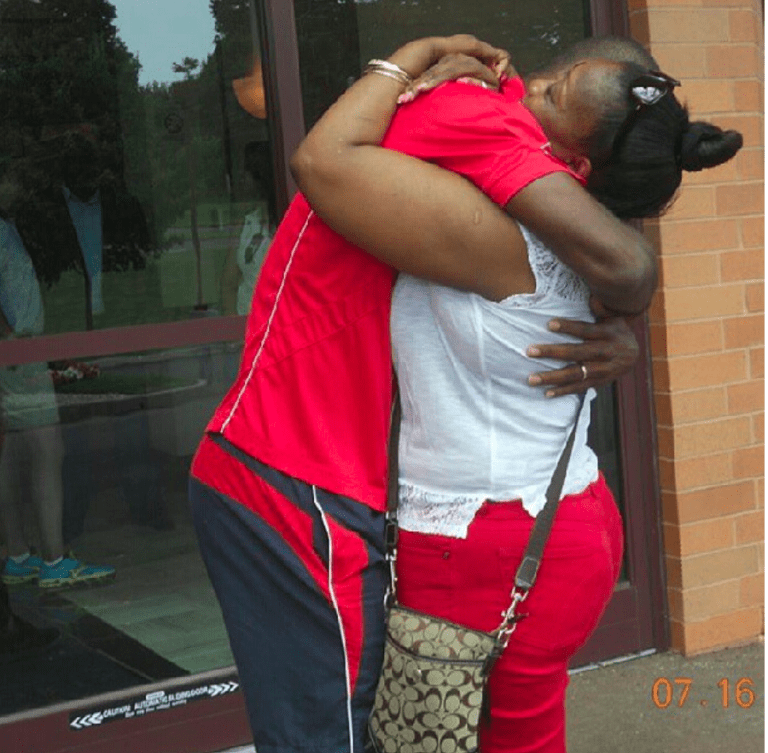
Today, their bond remains as strong as ever.
Manley said she “started from zero” in New York. Initially, she lived with her cousins and worked in housekeeping. Nowadays, she works in a physical therapy clinic and is currently in college pursuing a career in radiology. She also remarried and had another son, Aryel.
Though Aryel was born in New York and lives there now, he also spent a lot of time in Costa Rica as a young child, where he developed a close relationship with Waston.
“He was like my little baby,” Waston said. “I used to change his diapers as well … he was the brother that I always wanted.”
Aryel said he has always seen Waston as more of a “fatherly figure” than a big brother.
“He really treasured me,” said Aryel, adding that Waston texts him on a regular basis to check in. “He showed me love and respect and looked out for me, no matter what happened.”
Including the death of their grandfather, Earl.
Waston was raised by his grandparents after Manley moved to New York. His grandmother was the strict one, someone Waston credits for keeping him away from the wrong crowds. But Waston became especially close with Earl. They would often play together in the backyard with Earl’s dogs, and it was Earl that first taught him how to ride a bike.
“For me, my grandfather was like my grandfather, my father, my everything,” Waston said.
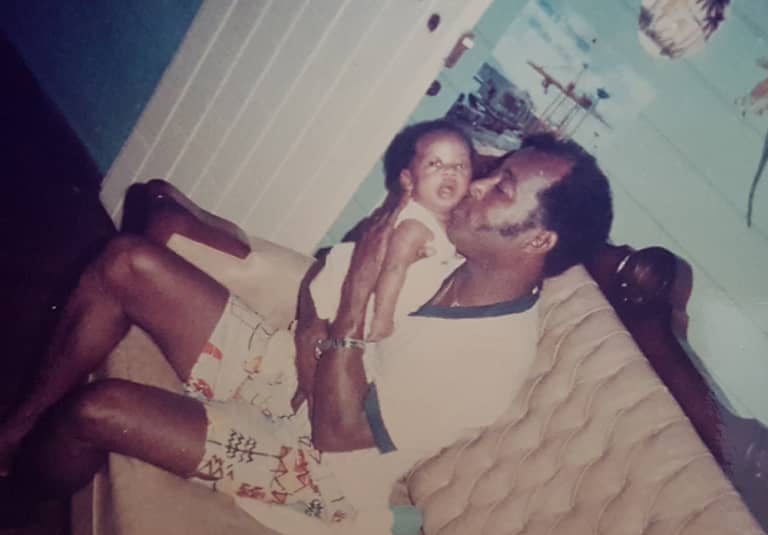
That’s why his death hit Waston so hard.
He remembers the day like it was yesterday. It was February 19, 2007 – the same day Waston travelled to Mexico for the 2007 U-20 CONCACAF Championship.
“That same day, he was with my grandmother and my brother in Costa Rica,” Waston recounts. “He said to my grandma, I’m going to shower before I see the news, because I want to see Kendall. In Costa Rica, at 7:45 p.m., they give the sports news, so he was expecting to see me.”
“He went to shower and then he went to the living room where my brother saw him. My brother came back to my grandma and said, ‘Why grandpa is sleeping in the floor?’ That was the time that my grandfather passed away.”
It was 2 or 3 a.m. when Waston received the call learning of his grandfather’s heart attack. He immediately threw his phone against the wall. He didn’t know what to do. He didn’t know what to say. Just like that, his grandfather was gone.
And to this day, Waston gets emotional talking about him.
“I remember my first game here at BC Place,” he said, fighting back tears. “During the national anthem, the roof was open, I was looking up in the sky and thinking … imagine my grandfather’s face. His smile. And feeling proud of me in that moment. Because he was really happy for anything I did. So I know wherever he is, he would be so, so proud of me.”
CHASING HIS DREAM
There’s a lot to be proud of. Most of all: Waston never stopped chasing his dream.
Like many young kids in Costa Rica, Waston grew up hoping to one day become a professional soccer player and represent his national team. One of his uncles played professionally in Costa Rica and Waston idolized players like Reynaldo Parks, a defender from Limón who had 43 caps with Costa Rica and over 100 appearances at the club level in Mexico.
“Oh, soccer in Costa Rica is crazy,” said Waston, who would often ride his bike to the beach to play soccer with friends. “You see people having breakfast, they are talking about soccer. Lunch as well and dinner. All day, soccer.”
“Anywhere I used to take him, it was like mamita, can you get me that football?” Manley recalled. “Even a plastic ball. Here we go. Sometimes my mom was upset because there were so many balls, saying come on you keep on buying balls and balls and balls. I don’t mind.”
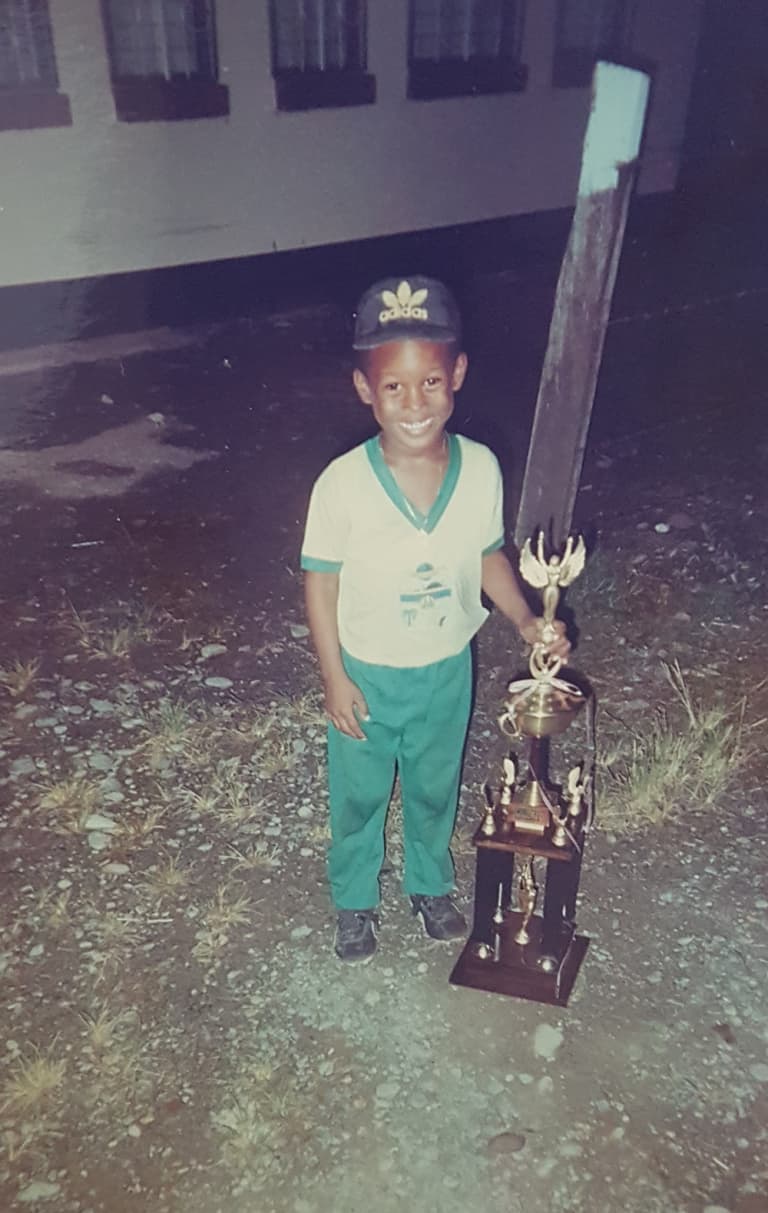
Waston was around seven or eight years old when he first joined a soccer club, but it was at the age of 15 when he truly became serious about the sport.
“There was a tryout of 380 kids from all of Costa Rica,” Waston said. “From those 380, only 30 are going to stay to join the national team under-15s. We practiced every day. And each day they were taking out people, taking out, until the end of the week. Only 30 of us stayed.”
In a sense, that was the easy part.
The hard part? Convincing his grandparents to let him move from Limón to San José to actually join the national team program.
“My grandma didn’t want to,” Waston said. “Because she was very strict and told me first of all was my studies. She wanted me to finish high school in Limón. And at the same time, my desire was to join the national team because that was my dream. So I remember I spoke with my mom, she told me that your grandma is with you, you’re living with her, so you have to do what she says. My grandma said, no, no, no, but something in me said keep chasing, keep chasing.”
And eventually, with the help of an uncle, Waston managed to get her permission.
“Because he told her, if anything happens, blame it on me.”
Not long after moving to San José, Waston joined the academy of Deportivo Saprissa – one of the biggest clubs in the country – and would eventually earn a professional contract.
But it certainly wasn’t all smooth sailing from there.
Waston struggled to break into the first team initially and spent a lot of time bouncing around on loan, including spells in Uruguay, Puerto Rico, and within Costa Rica.
“I went on loan from Saprissa, came back, went on loan, came back,” Waston said. “So, there was a moment I was thinking, ‘When is this thing going to end?’”
At one point at Saprissa, a coach even told Waston to “find something else to do.”
“At that moment, it hurt so much,” Waston said. “They said because you’re a big guy you should play basketball, because in Costa Rica you don’t find a lot of tall people. But I tried to use it in a good way. I was saying okay, I’m going to chase my dreams and at the same time I’m going to prove people wrong.”
That, he most certainly did.
Waston would go on to play 51 games for Saprissa, including a highly successful 2013-14 season in which he scored eight goals in 30 appearances while helping his side capture the Campeonato de Verano.
That was the year everything changed for Waston.
Just two days after he won the league title with Saprissa, Waston was named to Costa Rica’s provisional 30-man roster for the 2014 FIFA World Cup.
Finally, it appeared things were falling into place.
So Waston went off to join the national team for their final training camp before the World Cup, knowing only 23 players would make the final roster. Eventually, the list was whittled down to 25. And after their final training session, the final two cuts were announced in the locker room.
Waston was one of them.
“And I remember when the coach said my name, I just started to cry,” Waston said. “I started to cry like a baby because I felt everything end. I was thinking, now is the chance. If I go to Brazil, and if I have the opportunity to play, even five minutes, that could change my life.”
The initial disappointment of missing the World Cup was immense. Waston said it was as if he had a “towel in his eyes” in those next few days.
“I didn’t want to hear anybody,” he said. “My wife was the first one who told me, just come home, because my son was about one month at the time. When I saw my son at home, I was thinking a lot of things. But I couldn’t stop, I couldn’t leave everything and throw it in the garbage. I had to keep on working. After a little bit of that hard feeling inside, I had to man up and just move on.”
“I think being out of Brazil 2014 changed our lives,” Priscila said. “Changed our lives for good.”
RISE TO STARDOM
Meanwhile in Vancouver, 2014 was Carl Robinson’s first season as head coach of Whitecaps FC. In that first season, his starting centre back pairing was Jay DeMerit and Andy O’Brien – two high-calibre defenders who had English Premier League and World Cup experience.
At the same time, both players were 34 years of age and turning 35 that year.
“Jay DeMerit and Andy O’Brien were coming towards the end of their careers,” Robinson said. “And I felt that this league was in need of centre backs who have a big physical presence and who are a threat off set pieces.”
That, of course, describes Waston to a tee.
Robinson said he actually went down to Costa Rica to scout a different player but Waston stuck out to him due to his “raw ingredients” and what the ‘Caps boss felt was the “fundamentals to be a top-quality centre back."
Initially, the plan was to sign Waston in January 2015, but things got fast-tracked after DeMerit suffered what ended up being a career-ending Achilles injury in June 2014 – coincidentally, just seven days after Waston was released from Costa Rica’s World Cup roster.
“It was really quick because the agent came to Costa Rica on a Tuesday and he spoke to me and my wife and said there’s interest from Vancouver and another club,” said Waston, who at one point had tryouts with Real Salt Lake and Houston Dynamo but was never offered a contract. “We were saying maybe, the same talk of all the agents, that they have interest, interest and nothing happens.”
Mainly, Waston just wanted to know if the ‘Caps were serious. And if they were, he would go. Waston knew that joining MLS would be a smart career move – as well as a good move for his family. Ever since his son, Keysaack, was born, everything Waston did had him in mind.
“Before, I used to work hard for me, and when I got married, for my wife,” Waston said. “But when my son was born, it’s especially for him. I just try to give him the best life I can give him because I went through some things I don’t want to him to go through as well.”
There were times, for example, when Waston and Priscila didn’t have any food in their kitchen and would have to get help just to feed themselves. That’s something they never wanted Keysaack to experience. At the same time, Waston said he doesn’t want Keysaack to see him as a “provider.”
“I want him to see me like the dad that loves him no matter what,” he said.
So Waston waited for word from his agent, and within a few days, learned that Vancouver had made an offer and now only needed to strike a deal with Saprissa to finalize the transfer.
“I said wow, I didn’t expect it was going to be so quick,” Waston recalled. “Saturday night, the president of Saprissa called me, and at the beginning they didn’t want me to go. But I told them that my dream was to get out of the country because I want to improve and the only way to improve is to get out of your comfort zone. That was it. I got a flight on Monday.”
And he has never looked back since.
“The first day that I woke up here, I was like wow, it’s real,” Waston said. “It’s real because for me, looking back, what I’ve been through is not easy. Sometimes I have to pinch myself. Every day I thank God … living in this city, feeling so welcome, I feel like home here. I always say that. I feel like home. My wife and I talk about when my career ends, we want to live in Vancouver. I think that says enough.”
Whitecaps FC announced the signing of Waston on August 8, 2014, sneaking it in just before the close of the summer transfer window. He would make his debut later that month as a substitute striker – Robinson said he looked like “Bambi on ice” – before immediately establishing himself as an every day starter on the back line.
The 6-foot-5 centre back played a crucial role down the stretch, helping the ‘Caps keep five clean sheets in his nine starts and scoring the memorable goal that clinched Vancouver’s playoff spot in their final match of the 2014 MLS regular season.
The following year, his first full season in MLS, Waston was voted Whitecaps FC BMO Player of the Year, selected to the MLS Best XI, and named a finalist for MLS Defender of the Year after leading the ‘Caps to their best MLS season to date.
But in 2016, things didn’t go so smoothly.
That season, Waston was suspended six times. He was shown three red cards and went into the referee’s notebook 11 times. In many instances, he simply let his emotions get the best of him.
“When I cross that line, I change,” Waston said. “I don’t know why. I just love this game. And when I’m inside there, I fight for everything however it takes. Because if somebody wants to fight against my teammate, I will back him up. Because they are my family.”
“From the same passion, especially in 2016 when I had a lot of red cards and yellow cards, I wasn’t as focused as I needed to be. It’s part of getting mature and learning the bad things to improve on.”
Priscila said the Waston she knows is “so gentle and humble.” Whitecaps FC striker Kei Kamara said off the field Waston is “more of a cuddly person.”

When he steps on the field, however, Priscila said Waston is “a different person.”
Following the 2016 season, Waston and Priscila had many conversations about his disciplinary record. And so too did Waston and Robinson. In fact, it’s part of the reason why Robinson decided to give Waston the captain’s armband heading into 2017.
“I think sometimes he gets an unfair view because any challenge he makes, because he’s bigger and stronger than most people, if it’s mistimed by a second or two, it looks worse than it is,” Robinson said. “He trains properly, he plays properly, he does let his emotion get the better of him sometimes and that’s something that he’s been working at.”
“I think last year when I made him captain, people raised a few eyebrows because he’d been sent off four times prior,” Robinson added. “But it was the right decision because it kept him on the field for 34 games he played last year. So, lots of progression in his career and still more to go.”
Since joining MLS in 2014, no player has recorded more clearances (683) or blocks (88) than The Big Man. In fact, no one is even close. Waston has a combined 171 more clearances and blocks than the next closest player. The statistics speak for themselves.
Waston is the most dominating physical force in MLS.
“There have been other players who have come in this league who have been intimidating, have been physically a force in the game, but there’s a difference when you bring other parts,” said Sporting Kansas City head coach Peter Vermes. “Being a competitor, that has a different psychological edge for your team. When you know a guy like that doesn’t want to give anything away, and then demands that from other players around him, that takes your team to another level. I think that’s why he pushes into the upper echelon of those types of players because of his competitive nature.”
“There’s been a lot of good centre backs who have come through our league,” said Seattle Sounders FC head coach Brian Schmetzer. “We have a couple good ones as well, but he has to be top 10. I mean, he’s certainly in that conversation.”
Robinson, for his part, said Waston’s “heart, soul, and passion” epitomize what the ‘Caps are about as a team, adding that Waston has “meant everything” to the club during his time in Vancouver. And Whitecaps FC midfielder Russell Teibert, who has had a front row seat of Waston’s evolution over the last four plus years, was singing a similar tune.
“He’s a leader who wears his heart on his sleeve,” Teibert said. “You never want to take that away from someone. That’s just how he plays. He has true passion, true emotion, and a true love for the game, and that’s rare. Maybe over the course of some people’s careers, you lose sight of that. But you can still see the fire, the love that he has for the game, every day.”
Ultimately, Waston’s success with the ‘Caps has helped him secure his position on the Costa Rican national team. Prior to joining MLS, he had played two games for Los Ticos at the senior level – both as a substitute – for a combined total of 23 minutes.
Fast forward four years and Waston has 28 games under his belt, having played in the CONCACAF Gold Cup, the Copa América Centenario, and as of Wednesday, the greatest stage of them all.

